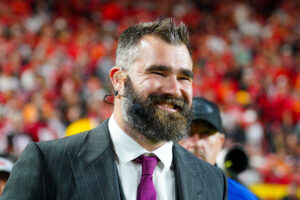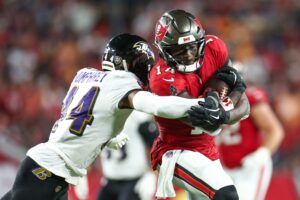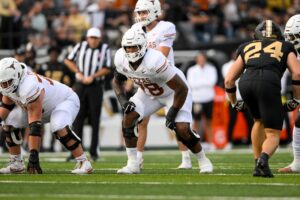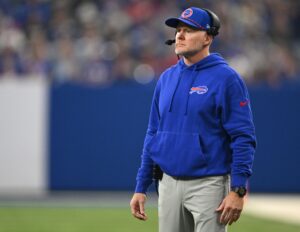The inevitable has finally happened. After rumors swirled all off-season, the Chicago Bears officially traded running back Jordan Howard to the Philadelphia Eagles in exchange for a 2020 late-round pick. Howard was a fantasy superstar in his first two seasons before taking a major step back under Matt Nagy in 2018. This trade obviously has a massive impact on the fantasy football landscape, so let’s break down whose stock is affected by the trade.
Fantasy Football: Jordan Howard Trade Winners and Losers
Big Winner: Jordan Howard
Jordan Howard dynasty owners have to be thrilled with this trade. Howard was one of the best fantasy running backs through the first two years of his career, but his value took a serious hit in 2018. Dual-threat running backs like Tarik Cohen are better for Matt Nagy’s scheme, so Howard spent most of 2018 playing second-fiddle to Cohen.
Howard won’t have that problem in Philadelphia. The Eagles currently have an uninspiring backfield led by Corey Clement, Wendell Smallwood, and Josh Adams. All three players have significant shortcomings which showed throughout the 2018 season. Howard should immediately fill in as the top early-down running back.
Players like Howard are highly dependent upon the blocking in front of them. Chicago’s offensive line was absolutely atrocious in 2018, finishing the year as Football Outsiders’ 28th-ranked run-blocking offensive line. Philadelphia, meanwhile, finished 2018 with the 20th-ranked run-blocking offensive line. The Eagles still have a below-average offensive line, but it’s significantly better than what Howard was working with last year. He might not repeat what he did in 2016 and 2017, but Howard can still be a strong RB2 in fantasy.
Slight Improvement: Tarik Cohen, Mike Davis
Whether Howard was around or not, Tarik Cohen was always going to be the primary running back for the 2019 Chicago Bears. Matt Nagy loves dual-threat runners, and Cohen was born to play in his scheme. During the 2018 season, Cohen recorded 444 rushing yards and three touchdowns to go along with 71 receptions for 725 receiving yards and five receiving touchdowns.
Cohen is good at what he does, but he’s not talented enough to be an every-down player like Alvin Kamara. Cohen is a fantastic option in the passing game, but he’s only a pedestrian runner. Throughout the 2018 season, Cohen averaged 4.5 yards-per-carry with a 44% success rate. The league average rushing success rate was 47.5%, so Cohen was nothing special on the ground.
This is where Mike Davis comes in. Davis spent the 2018 season as part of the Seattle Seahawks’ three-man backfield. During his limited action, Davis recorded 514 rushing yards and four touchdowns on 112 rushing attempts. Additionally, Davis added another 34 receptions for 214 yards and a receiving touchdown.
Essentially, Davis is a poor mans’ version of Tarik Cohen. Cohen finished 2018 as the RB13 in half-PPR scoring formats and should have a similar finish in 2019. Davis, meanwhile, should be a solid bench piece who you can start in a pinch. Howard’s departure allows more opportunities for Cohen and Davis, but their roles in the offense are relatively unaffected.
Essentially Unaffected: Corey Clement
Howard’s arriving will obviously shake up the Philadelphia Eagles’ backfield, but Corey Clement should be relatively unaffected. The third-year running back can carry the ball between the tackles but is much more effective in the passing game. During his first two years in the league, Clement averages 9.8 yards-per-reception compared to just 4.1 yards-per-carry.
Howard is the ying to Clement’s yang. The former Chicago Bear is a monster between the tackles but contributes nothing to the passing game. Look for Howard to serve as the early-down back with Clement taking the field in passing situations. Clement hardly has any fantasy value, but what little value he does have is unaffected by Howard’s arrival.
Down and Out: Wendell Smallwood, Josh Adams
There is no reason to own Wendell Smallwood or Josh Adams in any fantasy football format right now. Howard is vastly superior to both running backs and should be able to take the starting job by the start of training camp. This leaves Smallwood and Adams with no real role on the team. Neither Smallwood nor Adams is good enough to usurp Clement for the pass-catching role, and Clement might be the second-best between-the-tackles runner anyway.
Barring an injury, Smallwood and Adams are both staring down fantasy irrelevance. One of these two will probably make the Week One roster, but it’s hard to imagine both players making it. Even in the deepest of leagues, there’s no reason to have any interest in Smallwood or Adams.
Main photo:
Embed from Getty Images






